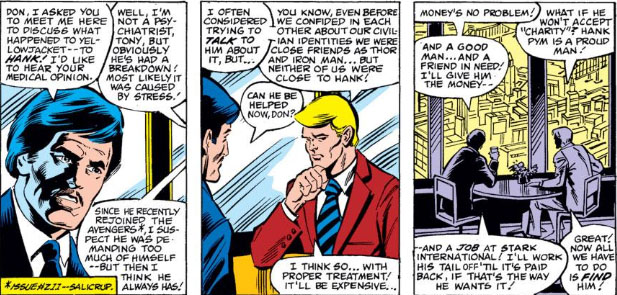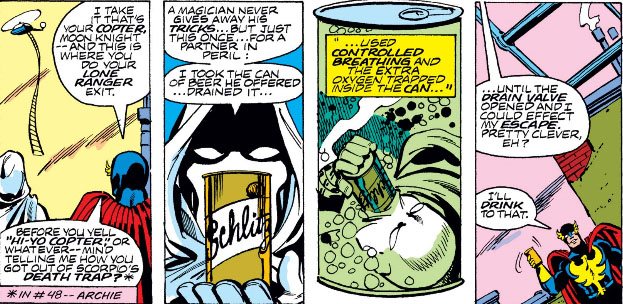Since we've spent a fair amount of time on Henry Pym lately, we should give due attention to the man who would become one of his most dogged foes--the man known as Egghead, who's introduced in December of 1962 just a few issues into Ant-Man's run in Tales To Astonish. Granted, Ant-Man's foes in that title were generally nothing to write home about; but when your archenemy turns out to be a man who takes pride in the name "Egghead," it's fair to say you're at the bottom rung of the hero ladder.
As far as super-villains go, we'd probably have to award the label of archenemy to the Human Top, Pym's most deadly foe in his early days, with Ultron of course rising later to menace not only Pym but all of the Avengers. Yet waiting in the wings was always Egghead, a normal human whose resourcefulness and ruthlessness, combined with his brilliance, made him a perpetual threat to Pym. (And he would have been a natural as one of the Headmen.) We've come to realize over time that Egghead is the type to hold a grudge, to be sure--but how did his anger and resentment toward Pym take root?
Like many villains, Egghead began his life of crime because of his desire for and need of money--and he didn't appear to have any scruples whatsoever as to how to go about obtaining it. In fact, when we first encounter him, he's already in hot water--a scientist working for the government, who had decided that there aren't nearly enough zeros in his paycheck and concludes that slipping government secrets to foreign powers will put him on Easy Street.
"To a genius like me your insipid patriotic ramblings are laughable! I sneer at you all!" Scripter Larry Lieber may have been an unsung talent at Marvel, but he had his moments. It seems evident that Egghead already has his own thoughts on what status he feels he's due. It's also interesting to note a total lack of remorse in his character, a character trait we've already seen he would come to use as a ploy when necessary.
In a way, it's actually Ant-Man's effectiveness as a crime-fighter (as odd as that comes out sounding) that we have to thank for opening the door for Egghead with the criminal underworld that he would often seek out to help him further his plans. The news of Egghead being drummed out of his position with the government eventually reaches a few notables of that underworld, who have been driven underground by Ant-Man and who are desperately looking for someone to deal with a threat no larger than a thumbnail. And for Egghead, these men already have gotten wind that the best way to gain his cooperation is to flash a wad of green bills in front of him.
"Brute force ain't the answer!" Well, we're pretty sure that it is, since Ant-Man mostly chooses to remain at ant size during his early exploits and relies on his ants as back-up, limited to the more slow-acting growth abilities that his gas-based power affords him and not yet able to more extensively take advantage of his size-changing advantage. Ant-Man may have the strength of a full-grown man at ant size, but it's a fair bet he'll still go *SPLAT* when Lefty or Edward G. Robinson here brings their foot down on him. And speaking of the actor from Hollywood's Golden Age, Egghead's debut is one of several rare instances where the actor's likeness makes a delightful surprise appearance in a Marvel story.
As for Egghead, the mob's dough is money well spent, since he almost immediately produces results by deducing and duplicating one of Pym's earliest discoveries: how to communicate with the insect world. From there, it's a simple matter for him to lay a trap for his foe.
Egghead might have been better served by using his technology to direct the ants, rather than offering them a choice between himself and Pym, but we'll get to that in a moment.
When the time comes for Egghead to spring his trap, it looks like the ants are on board, with Pym walking right into it. (Or in this case, being bellowed into it.)
With Ant-Man free, it isn't long before Egghead is forced to flee and the gunmen are routed--including our poor Mr. Robinson stand-in, "see"?
Pym is being a little misleading as to the psychology of his little "friends," since they're only his willing allies as long as he wears his cybernetic helmet that allows him a measure of control over them. Egghead was on the right track when he offered to "free [the ants] from the Ant-Man's rule," since that's precisely what Ant-Man's power over them involves. Take, for instance, the incident where Whirlwind (our former Human Top) drops both Pym and the Wasp into an ant colony without the benefit of their cybernetic control technology. Fortunately, there was a stash of circuitry within the tank that Pym was able to salvage into a makeshift device, just in time to save their lives.
Had Egghead devised technology that could make the ants follow his own directives, this story might have turned out differently for him. Instead, he heads to a refuge he would come to know well in the years ahead--the Bowery in Manhattan's lower east side (also known at the time as "Skid Row"), where he would simmer and make future plans to gain his revenge on Henry Pym.
COMING UP:
Egghead bounces back! (He didn't stay holed up for long, did he?)
Just how often did Mr. Robinson moonlight in Marvel Comics?
 | Tales To Astonish #38 Script: Larry Lieber Pencils: Jack Kirby Inks: Dick Ayers Letterer: Jon D'Agostino (as Johnny Dee) |

















































